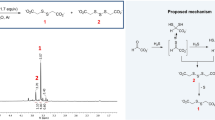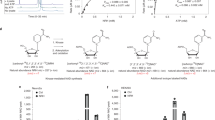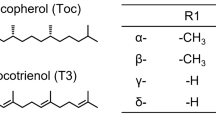Abstract
VITAMIN A is stored in rat liver largely as its ester with small amounts of the alcohol, but is transported in the normal circulating blood in the latter form1. Although it was generally believed that the alcohol form is the more physiological state of the vitamin, since the work of Dowling and Wald2, it is being recognized that vitamin A acid and not the alcohol may be nearer to the ‘active vitamin A’. If this were to be so, it would be important to demonstrate that a mechanism exists in the rat for the production of vitamin A acid from vitamin A alcohol through the intermediate, the aldehyde. Regarding the formation of the aldehyde, it has been well established that the alcohol dehydrogenase can bring about the conversion of vitamin A alcohol to retinene3. The presence of an enzyme in rat and pig liver catalysing the oxidation of retinene1 and retinene2 to the corresponding acids has been demonstrated in the present work and the partially purified enzyme preparation shown to be completely devoid of alcohol dehydrogenase activity.
This is a preview of subscription content, access via your institution
Access options
Subscribe to this journal
Receive 51 print issues and online access
$199.00 per year
only $3.90 per issue
Buy this article
- Purchase on Springer Link
- Instant access to full article PDF
Prices may be subject to local taxes which are calculated during checkout
Similar content being viewed by others
References
Ganguly, J., Vitamins and Hormones, 18, 387 (Academic Press, New York, 1960).
Dowling, J. E., and Wald, G., Proc. U.S. Nat. Acad. Sci., 46, 587 (1960).
Bliss, A. F., Arch. Biochem. Biophys., 31, 197 (1951).
Ball, S., Goodwin, T. W., and Morton, R. A., Biochem. J., 42, 516 (1948).
Balasundaram, S., Cama, H. R., Sundaresan, P. R., and Varma, T. N. R., Biochem. J., 64, 150 (1956).
Cama, H. R., Dalvi, P. D., Morton, R. A., Salah, M. K., Steinberg, G. R., and Stubbs, A. L., Biochem. J., 52, 535 (1952).
Mahler, H. R., Mackler, B., and Green, D. E., J. Biol. Chem., 210, 465 (1954).
Futterman, S., and Saslaw, L. D., J. Biol. Chem., 236, 1652 (1961).
Kofler, M., and Rubin, S. H., Vitamins and Hormones, 18, 315 (Academic Press, New York, 1960).
Farrer, K. R., Hamlet, J. C., Henbest, H. B., and Jones, E. R. H., J. Chem. Soc., 2666 (1952).
Mahadevan, S., and Ganguly, J., Biochem. J., 81, 53 (1961).
Mahler, H. R., Methods in Enzymology, edit. by Colowick, S. P., and Kaplan, N. O., 1, 523 (Academic Press, New York, 1955).
Dmitrovsky, A. A., Biokhimiya, 26, 126 (1961).
Author information
Authors and Affiliations
Rights and permissions
About this article
Cite this article
BAMJI, M., MAHADEVAN, S., LAKSHMANAN, M. et al. Oxidation of Vitamin A1 and Vitamin A2 Aldehydes to the Corresponding Acids by Enzymes from Pig and Rat Livers. Nature 196, 672–673 (1962). https://doi.org/10.1038/196672b0
Issue Date:
DOI: https://doi.org/10.1038/196672b0
This article is cited by
Comments
By submitting a comment you agree to abide by our Terms and Community Guidelines. If you find something abusive or that does not comply with our terms or guidelines please flag it as inappropriate.



